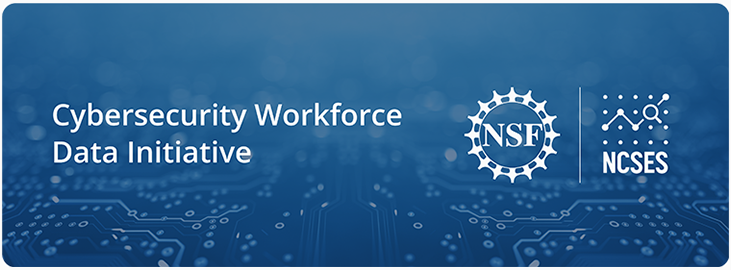Cybersecurity Workforce Data Initiative Workshops

The Cybersecurity Workforce Data Initiative (CWDI), mandated by Public Law (P.L.) 117-167 and led by the National Center for Science and Engineering Statistics within the U.S. National Science Foundation, is assessing the feasibility of producing national estimates on the U.S. cybersecurity workforce. As part of this effort, the CWDI held three workshops in 2024. Through these workshops, 321 participants provided input for shaping a possible future federal data collection on the U.S. cybersecurity workforce. Each workshop included the following:
- An introductory presentation
- A panel discussion and Q&A with three cybersecurity workforce experts
- Breakout groups to solicit feedback on the given topic
Below are details on and the materials from each workshop.
CWDI Workshop #1: Defining the Cybersecurity Workforce
The cybersecurity workforce is characterized by a combination of knowledge, skills, and roles, with various industry leaders defining the workforce differently depending on the context. Although multiple entities within and outside the federal government have used a range of definitions to identify cybersecurity professionals, no universal definition is suitable for collecting nationally representative data on this workforce. Additionally, instead of a single categorization, some individuals may be core cybersecurity professionals, whereas others may be adjacent to the field. This workshop helped inform how the cybersecurity workforce will be defined in potential future national statistics describing the U.S. cybersecurity workforce.
This workshop featured a panel discussion with
- Rodney Petersen from the National Institute of Standards and Technology
- Marinda Hamann from ISC2
- Melissa Dark from Dark Enterprises
May
7
Workshop Materials:
May 7 •
Tuesday, 1:00–3:00 p.m. EDT
CWDI Workshop #2: Understanding the Knowledge Gaps: What Do We Need to Learn about the Cybersecurity Workforce?
The United States needs better data on the cybersecurity workforce. However, there is much debate about what types of information would be the most useful. Understanding the professional pathways of cybersecurity workers and the skills they hold in various roles is a priority. Having a better understanding of the on-ramps and advancements in cybersecurity careers may help additional workers transition into the field. Stakeholders are also seeking data that will help them in understanding cybersecurity workforce needs from the employer perspective, better identifying what skills and qualifications U.S. employers want and understanding how employers are currently filling those roles. This workshop provided multiple perspectives on these knowledge gaps, alongside discussions about how the CWDI may prioritize and address these data needs.
This workshop featured a panel discussion with
- Akash Kaura from LinkedIn
- Amanda Theel from Argonne National Lab
- Simone Petrella from N2k
May
23
Workshop Materials:
May 23 •
Thursday, 1:00–3:00 p.m. EDT
CWDI Workshop #3: Aligning the Supply and Demand of Cybersecurity Professionals
As the cybersecurity workforce grows quickly and job demands evolve, the gap persists between experienced cybersecurity professionals and the workforce pipeline. Several important challenges exist in better aligning the supply and demand of the U.S. cybersecurity workforce. First, many employers are unwilling to hire workers without relevant experience, making it challenging for those new to the field to find positions. Second, data and industry leaders note a lack of on-ramps into the profession, and the various combinations of training and experience needed to be successful in the field are not always clear to workers or hiring managers. Identifying the specific needs of U.S. companies will allow workers to get the qualifications to better fill those gaps. Third, there is a concern that stereotypes about professionals in the field harm recruitment, and this challenge needs to be addressed to strengthen the supply of workers. Lastly, the complex and opaque landscape of degrees, certificates, and prior work experience further complicate the workforce pipeline. This workshop focused on these supply-and-demand mismatch challenges, including discussions about how knowledge gaps affect the way the field understands that mismatch, and provided input into how to address these concerns.
This workshop featured a panel discussion with
- Tatyana Bolton from Google
- Toni Benson from the Cybersecurity and Infrastructure Security Agency at the Department of Homeland Security
- Will Markow from Lightcast
Jun
11
Workshop Materials:
June 11 •
Tuesday, 1:00–3:00 p.m. EDT
Questions about the workshops? Please contact
CWDI
ncsesweb@nsf.gov
ncsesweb@nsf.gov
 An official website of the United States government
An official website of the United States government

